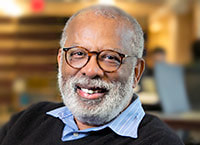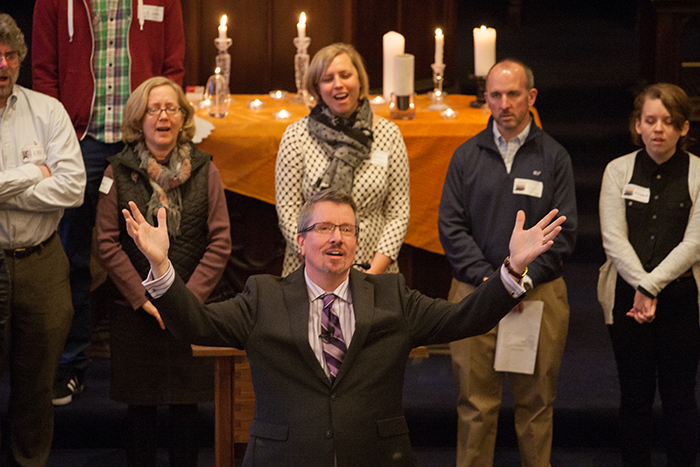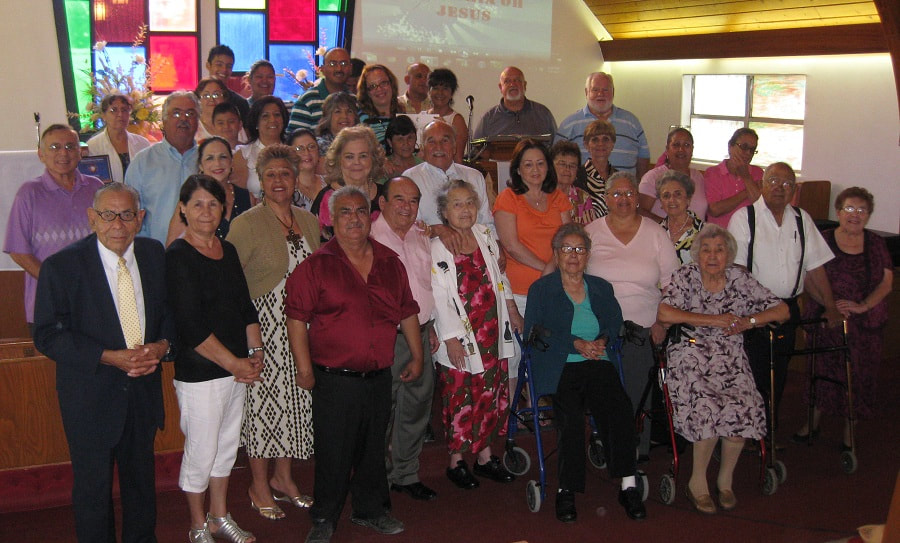|
Ministry of Formation and Persistence
Rev. Jeff Krehbiel, IAF Leader, 1992-2017 “…And the Lord said, “Listen to what the unjust judge says: And will not God grant justice to his chosen ones who cry to him day and night? Will he delay long in helping them? I tell you, he will quickly grant justice to them. And yet, when the Son of Man comes, will he find faith on earth?” Luke 18: 6-8 In my first week of organizing, I followed Rev. Jeff Krehbiel down a dark and chaotic block—horns blaring from speeding cars & shouts from drug dealers for offers to buy— to the home of Jenny Bernadel, a member of West Presbyterian Church in Wilmington, DE. I had recently been assigned to work with Rev. Krehbiel and other religious and community leaders to build an IAF organization in Wilmington. Rev. Krehbiel asked me to visit Ms. Bernadel, a Jamaican-American member of his church, who lived in the most well kept home on her otherwise blighted Eastside Wilmington block. Ms. Bernadel was afraid to leave her house after coming home from work to go to Bible study. Police, she said, never patrolled in her neighborhood and the local recreation center was closed so the teenagers had nothing to do, except harass people. Ms. Bernadel was angry and distraught as she spoke; she didn’t know what to do. Rev. Krehbiel took her hand and asked “who else in the neighborhood do you know that feels the way you do?” The next week we returned to Ms. Bernadel’s house and met with 5 of her neighbors, launching a year long organizing drive for community policing and youth investment. The campaign culminated in a showdown with then Senator Joseph Biden about the misappropriation of Federal Community Policing funding by the Wilmington Police Department— instead of deploying beat cops to patrol Ms. Bernadel’s and other Wilmington neighborhoods, the department bought armored trucks and other heavy weaponry. Rev. Krehbiel challenged Senator Biden in an early morning meeting with other IAF leaders at Bethel AME as he started to defend the police department. “Senator, we want the $10 million in Community Policing monies in Wilmington to be used for officers to walk a beat in Ms. Bernadel’s neighborhood and we are going public with our demand in two weeks.” Senator Biden’s face turned red and the vein on the side of his head started pulsing….. he was speechless…with rage. He left almost immediately after this confrontation, making no commitments. At a packed IAF action with 500 leaders at Bethel Apostolic Temple two weeks afterward in the pouring rain, Wilmington’s Mayor and Police Chief announced the reassignment of officers to Wilmington’s neighborhoods and monies to expand recreation opportunities at an Eastside Boys and Girls Club. Ms. Bernadel never missed a West Presbyterian Bible Study after that. She told me later it was the first time a pastor had visited her home. Rev. Jeff Krehbiel practiced ministry on the ground: in homes, neighborhoods, homeless shelters, recreation centers, churches, and taverns. IAF organizing formed Jeff. In turn through song, conversation, worship, faith, anger and persistence, he formed us: young adults, cities, congregations, politicians, neighborhoods, denominations, senators and a vice president, and organizers. Jeff led the drive for the next generation of Presbyterian Clergy to take up community organizing; now it is a growing movement in the denomination through Next Church. His mentor: the Rev. George Todd would be proud. Jeff reorganized West Presbyterian and Church of the Pilgrims, into vital congregations using the practices of IAF relational organizing. Working with other leaders at Washington Interfaith Network, Jeff helped lead the renaissance of DC neighborhoods with more affordable housing, renovated libraries and recreation centers, and green jobs. He helped transform DC’s corrupt and evil homeless service system from warehousing families to providing permanent supportive housing . For Jeff, faith and organizing were symbiotic. Over 20 years, I organized with Jeff in Wilmington and Washington DC, a witness to and beneficiary of his faith in the transforming power of organizing for ordinary people, for the church, and for the world. “And yet, when the Son of Man comes, will he find faith on earth?” Without question: in the ministry of formation and persistence of Rev. Jeffrey Krehbiel. ——Martin Trimble, Metro IAF Supervising Organizer MD,DC, VA, NC
2 Comments
By Ramon Duran
With great consternation, throughout the land, we hear the complaint of Russian interference in US elections. Notwithstanding the hypocrisy of the complaint (take note of how our elected leaders, in our name, given that we elected them, have interfered in the elections of other nations, Nicaragua, Chile, Guatemala, El Salvador, Israel, to name a few examples; and note, in some instances, such interference has included violence and the overthrow of legitimately elected governments), the possibility of Russian interference is predicated on the ignorance of American voters, a situation of our own making, that has nothing to do with Russian interference (I am sure we would interfere in Russian elections as well, were there any actual elections in Russia). After all, it is not as if Russian operatives were hacking into voting machines and changed people’s vote. It is as simple as using what everyone has access to, namely social media, and flooding that media with false or misleading information (recall Nyberg: power depends upon consent and consent can be achieved by means of outright lies, misleading or partial information). It seems, in fact, that the possibility of manipulating our democracy is predicated on the fact that we do not practice democracy in the first place. And so as not to be naïve, we ought to be clear that the method of manipulating how people vote is not limited to the Russians, but is practiced by a plethora of operatives representing every US political party imaginable. Was it not Malcolm X who said, if you don’t stand for something, you’ll fall for anything? And that’s the point: what does it mean to stand for something? To carry the metaphor further, to stand requires that you have a position. Alexi de Tocqueville, in his study of American democracy, ascribed the vibrancy of democracy in America to three institutions: the family, the church and participation in local politics. In present day American politics, the first two institutions, the family and the church are used like ketchup, something that is poured over everything but has no substance and adds nothing (those who pour God over all their political speeches and platforms would have to stand shamefaced before the electorate were they to be confronted by the pronouncements of the Prophet Amos). The last institution is by and large ignored. Nonetheless, it is by virtue of these three institutions that we develop political positions (and consequently, not only do others know where we stand, but we ourselves understand where we stand). Political positions are not innate, they are dialogical. This is to say, that political positions emerge in conversation with others, about family, neighborhood, community and the issues that challenge the wellbeing of these social institutions. The key ingredient here is the notion of conversation (not to be confused with communication) understood as “public,” i.e. not among family members but among those with whom we share the wider community (neighborhood, city, county, etc.). The possibility of such conversations requires local institutions (such as churches, schools, etc.) in which it is appropriate to conduct such conversations (sadly, a very small minority of these institutions open their doors, or understand it as an element of their mission, to be a public space in which these conversations can take place. Institutions in which it is appropriate to engage others in public debate and conversation have become fewer and fewer: certainly not the local mall or the grocery store). These public conversations begins with how participants understand their own individual interest; not with a discussion with what is best for everyone together, but what is best for me and my family. But it is in the context of these conversations that people begin to negotiate with one another, in a sense they practice politics, and come to a political (i.e. public) position. This takes place in the context of compromise, a decision reached by mutual concessions, as opposed to a consensus. Recall Lindbloom: those groups that achieve positions are those that begin with what is best for me, not what is best for the group. It is through these discussions, through compromise, that we emerge from these conversations with a wider understanding of interest, in that it now includes the interests of my neighbors and fellow citizens, given that I will not be able to achieve what I want without the cooperation of others and visa-versa. I will concede your need for street lighting (and consequently my commitment to work with you) if you concede my right for a neighborhood park (and consequently your commitment to work with me). Imagine the difference in a citizens’ assembly (as opposed to a candidates forum) in which candidates are not asked to tell us how to address the issues that they face (and then are able to tack snappy slogans that obfuscate such as “make America great again,” or “hope that you can believe in”), but in which citizens (understood in the moral sense, as one who engages in the development of public life as opposed to a legal understanding) have identified the issues, have researched and reached a position on how to address these challenges, and in which they ask candidates to commit to their solution. The former exposes people to verbal diarrhea; the latter requires a simple yes or no on the part of the candidate. This is what it means to stand for something, to take a stand, to hold a position. It is in fact, how we create the possibility of standing with one another. But it takes focused and intentional public work. It is in the context of such a citizens’ assembly that people will not “fall for anything.” Recall again Nyberg: power depends upon consent, and another way of achieving consent is informed judgement – we have enough information to understand how our vote will affect our self-interest (expanded in the context of community conversations). This is not about endorsing any candidate, or telling people how to vote. If people have developed political judgement, they will understand how to vote without anyone having to tell them as they are herded to the polls. The threat to democracy is not the Russians; it’s the fact that, by and large, we have not practiced it; we have not taken the time to develop a praxis of practical democracy and have settled for sloganeering and the manipulation of consent in a cynical power grab based on the love of money over neighbor. Was it not Jesus who said, you cannot serve both God and money; you will love one and hate the other. To serve God is to be a neighbor. A possible solution: back to Tocqueville – family, congregation and local politics. Who are the pastors, the school principals, the directors of private social service agencies and clinics, the presidents of labor locals, who will open their doors to the people and the public conversations through which democracy is born, and re-born, and re-born.
When most people think of democracy, they are apt to think of Congress or their state legislature. They are apt to think about primaries, elections and party conventions. What most people will tend to overlook is what happened tonight, Feb. 1, 2018 in Del Rio Texas, Val Verde County.
At 6:15 PM, people began to file into the parish hall at Principe de Paz Methodist Church in the San Felipe neighborhood. By 6:30, thirty people had gathered, almost entirely Hispanic, some speaking only Spanish, some speaking mostly English. Most of them the type of people reviled and demonized by the president of the United States. Once gathered, leaders divided them in groups of ten and they initiated a public discussion among themselves about their families, their neighborhoods, the issues that they face in their daily lives. But these conversations were much more than that. These people were in fact practicing civil liberties that very few Americans understand; they were practicing the right of assembly and freedom of speech, understood as engaging in conversation around issues that affect the public welfare. They discussed a park that needs new playground equipment; a street that needs a speed bump or stop sign to prevent speeding; improving the 911 emergency service; loose or dead animals on their streets; and many other issues. But this was not merely an inventory of complaints. As issues were discussed, participants took assignments to pull together residents in more meetings around parks snd streets; to develop a plan to improve 911 emergency service; to meet with the state representative about protecting the ground water supply from water marketers. People ended the meeting by agreeing to invite more of their neighbors to these gatherings, another ten gatherings as they not only build an action agenda of issues, but the constituency to move it forward. Now, that’s democracy. 
A Guest Blog By Distinguished Professor James E Coleman At Duke University Law School
I have not followed the story closely enough to have any authoritative view on any of this, but I am not prepared to accept what either Rowley or Blumenthal claim on the video. You cannot critique the affidavit filed in the FISA court based solely on the Nunes memo. Nor can you judge the significance of the DOJ official’s conflict without knowing what was in the memo supporting the application for the warrant. In both cases, the two commentators assume that the information that would make the warrant inappropriate was missing from the application. For example, what part of the Steele dossier was used in the application. We don’t know, nor can we find out unless the application and supporting affidavit are disclosed. Since that won’t happen, people can make whatever self-serving claim they want, knowing that we are unlikely ever to have the evidence to judge their claim. Blumenthal says several times that the Steele dossier has been discredited. That’s not accurate. Some of it has not been corroborated. That is not the same as being discredited. Since we don’t know which parts were used by the FBI to obtain the warrant, we don’t know whether it has been discredited, not corroborated, or independently corroborated. My guess is that the FISA judge did not sign the warrant and then renew it three times based on uncorroborated information. Democrats on the House Intelligence Committee claim the application disclosed to the Court the political origin of the dossier. Blumenthal focuses on the fact that the Clinton and DNC provided funding to assemble the dossier. In fact, the Republicans initiated the research. It was picked up by the Clinton campaign after Trump became the nominee. So, if we are going to be accurate, we need to parse the dossier into the pieces that were assembled before Clinton and the DNC took over the research and what was added after they began to support it. In the end, the question is whether there was a factual basis to obtain a warrant on the ground that Carter Page was knowingly collaborating with a foreign government. The answer to that seems to be yes. Not only did the FBI get the warrant in the first place, it got the warrant renewed several times. The renewals had to be based on proof that the warrants were yielding evidence. Again, blaming Rosenstein for signing the applications for the renewals, without disclosing the basis on which the renewals were sought is disingenuous. It is certain that the renewals were not based solely on the Steele dossier. But as any lawyer knows, the source on information on which criminal wiretaps are obtained are often tainted, often by the criminal history of the source. Nevertheless, the job of the court is to determine if the information is credible, not whether its source was a Boy Scout. Bottom line: no one can make a credible assessment of whether the FISA court was misled (for political reasons? To discredit Donald Trump? Before the November 2016 election?) without seeing the entire FISA application. Anyone who says differently is ignorant of how the FISA process and top federal judges operate. Those who are familiar with both are calling the Nunes memo misleading. Given the memo’s goal, I agree with that conclusion. Moreover, my instinct is that this is like the Chaney/Libby play through The NY Times that Rowley mentions: I believe the Trump people initiated this process and now are waving the memo that they generated and claiming to be shocked that there is gambling in Casablanca. The only danger in this is if Trump uses the memo to fire Rosenstein. I think that alone would be an obstruction of justice engineered by Trump and Congressional Republicans. As Bill Greider might say, “who will tell the people?” |
Frank C. Pierson, Jr.Frank Pierson retired after forty years of work with the Industrial Areas Foundation (IAF) as a professional organizer. He began his career in 1971 in Chicago, moved to Queens, New York City and migrated west to work in Arizona, New Mexico, Nevada and Colorado. He resides with his wife, Mary Ellen Kazda, in Oracle, Arizona. He may be reached at [email protected] Archives
June 2018
|




 RSS Feed
RSS Feed
